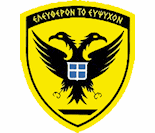Greece - Hellenic Army - 19th Century History
 Count Capodistrias was elected president of Greece on 14 April 1827 for a period of seven yearsl. The first measures of Capodistrias were prompt and judicious. He could not put an immediate stop to some of the grossest abuses in the army, navy, and financial administration, without assuming dictatorial power. The necessity of this dictatorship was admitted; and the manner by which he sought its ratification from the existing government and the representative body, was generally approved.
Count Capodistrias was elected president of Greece on 14 April 1827 for a period of seven yearsl. The first measures of Capodistrias were prompt and judicious. He could not put an immediate stop to some of the grossest abuses in the army, navy, and financial administration, without assuming dictatorial power. The necessity of this dictatorship was admitted; and the manner by which he sought its ratification from the existing government and the representative body, was generally approved.
The consequence of the unmilitary president attempting to regulate the details of military organization, was that the Greek army remained without either order or discipline. A few reforms were introduced, tending to enable the president to know how many men Greece had in the field, and to diminish the frauds committed in the distribution of rations; and this introduction of a regular system of mustering, paying, and provisioning the troops by the central government deserves praise, though it was a very small step towards the formation of a Greek army.
The circumstances in which the Greek soldiery were placed at this epoch of the Revolution afforded great facilities for the introduction of military discipline, and for the formation of an efficient national army of veteran troops. The soldiers had eaten up the substance of the agricultural population, and were themselves in danger of starvation. Capodistrias, holding in his hands the absolute disposal of all the supplies from abroad on which the troops were dependent for pay and rations, could command their obedience to any terms he might impose. The most powerful chieftains only maintained a few followers by seizing the public revenues. They were hated by the people for their extortions, envied by the mass of the soldiery for the benefits they conferred on a few, and in open hostility with the public interests.
The arrival of Capodistrias annihilated their usurped power, and the chieftains who kept possession of the fortresses of Corinth, Nauplia, and Monemvasia, in defiance of the preceding government, were compelled to surrender those places into his hands. A camp was formed at Troezene, to which all the troops of continental Greece in the Morea were summoned, in order that they might receive their new organization. The president appeared and promulgated his scheme for the formation of a national army. About eight thousand men, consisting in great part of the armatoli who had remained faithful to the Greek cause, were divided into eight regiments or chiliarchies. The chiliarchs or colonels, and the other officers of these regiments, were named by the president. Paymasters were also appointed, and a regular commissariat formed, so that an end was put to the previous system of trading in rations.
The facility with which every reform was adopted by the soldiers, and their alacrity in preferring the position of government troops to that of personal followers of individual chieftains, proved that the president might easily have effected much more than he attempted. The new regiments were inspected by the president at Troezene in February 1828. The men had the aspect of veteran soldiers; still the review presented a very unmilitary spectacle. The chiliarchies were only distinguished by being separate groups of companies. The different companies were ranged in various forms and figures, according to the fancies of their captains—some were spun out in single files, some were drawn up four deep, some seemed to form circles, and some attempted to form squares. At last the whole army was ranged in lines, straggling in disorder, and undulating in unmeaning restlessness. The review, if such a spectacle can be called by a military term, was a parade for the purpose of enabling the inexperienced eye of the president to count the companies and examine the men of whom they were composed.
|
NEWSLETTER
|
| Join the GlobalSecurity.org mailing list |
|
|
|

